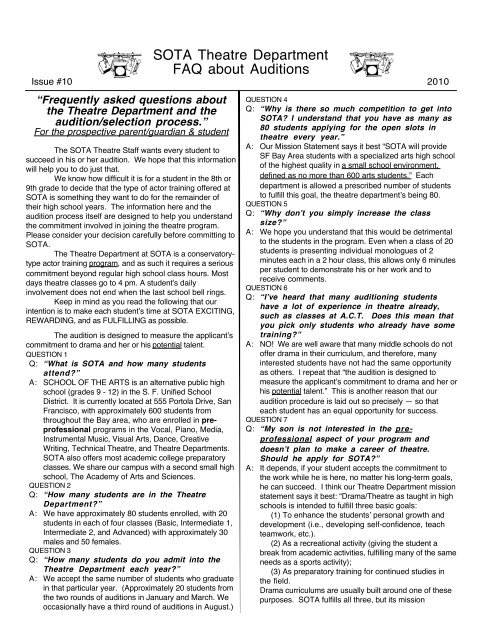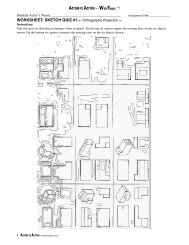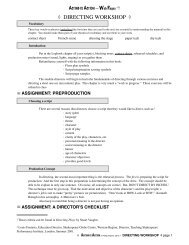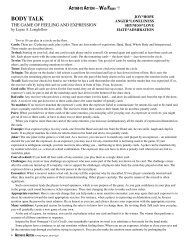Audition FAQ Pamphlet - the Asawa SOTA Theatre Department!
Audition FAQ Pamphlet - the Asawa SOTA Theatre Department!
Audition FAQ Pamphlet - the Asawa SOTA Theatre Department!
- No tags were found...
Create successful ePaper yourself
Turn your PDF publications into a flip-book with our unique Google optimized e-Paper software.
The <strong>SOTA</strong> <strong>Theatre</strong> Staff wants every student tosucceed in his or her audition. We hope that this informationwill help you to do just that.We know how difficult it is for a student in <strong>the</strong> 8th or9th grade to decide that <strong>the</strong> type of actor training offered at<strong>SOTA</strong> is something <strong>the</strong>y want to do for <strong>the</strong> remainder of<strong>the</strong>ir high school years. The information here and <strong>the</strong>audition process itself are designed to help you understand<strong>the</strong> commitment involved in joining <strong>the</strong> <strong>the</strong>atre program.Please consider your decision carefully before committing to<strong>SOTA</strong>.The <strong>Theatre</strong> <strong>Department</strong> at <strong>SOTA</strong> is a conservatorytypeactor training program, and as such it requires a seriouscommitment beyond regular high school class hours. Mostdays <strong>the</strong>atre classes go to 4 pm. A student!s dailyinvolvement does not end when <strong>the</strong> last school bell rings.Keep in mind as you read <strong>the</strong> following that ourintention is to make each student!s time at <strong>SOTA</strong> EXCITING,REWARDING, and as FULFILLING as possible.The audition is designed to measure <strong>the</strong> applicant!scommitment to drama and her or his potential talent.QUESTION 1Q: “What is <strong>SOTA</strong> and how many studentsattend?”A: SCHOOL OF THE ARTS is an alternative public highschool (grades 9 - 12) in <strong>the</strong> S. F. Unified SchoolDistrict. It is currently located at 555 Portola Drive, SanFrancisco, with approximately 600 students fromthroughout <strong>the</strong> Bay area, who are enrolled in preprofessionalprograms in <strong>the</strong> Vocal, Piano, Media,Instrumental Music, Visual Arts, Dance, CreativeWriting, Technical <strong>Theatre</strong>, and <strong>Theatre</strong> <strong>Department</strong>s.<strong>SOTA</strong> also offers most academic college preparatoryclasses. We share our campus with a second small highschool, The Academy of Arts and Sciences.QUESTION 2Q: “How many students are in <strong>the</strong> <strong>Theatre</strong><strong>Department</strong>?”A: We have approximately 80 students enrolled, with 20students in each of four classes (Basic, Intermediate 1,Intermediate 2, and Advanced) with approximately 30males and 50 females.QUESTION 3Q: “How many students do you admit into <strong>the</strong><strong>Theatre</strong> <strong>Department</strong> each year?”A: We accept <strong>the</strong> same number of students who graduatein that particular year. (Approximately 20 students from<strong>the</strong> two rounds of auditions in January and March. Weoccasionally have a third round of auditions in August.)<strong>SOTA</strong> <strong>Theatre</strong> <strong>Department</strong><strong>FAQ</strong> about <strong>Audition</strong>sIssue #10 2010“Frequently asked questions about<strong>the</strong> <strong>Theatre</strong> <strong>Department</strong> and <strong>the</strong>audition/selection process.”For <strong>the</strong> prospective parent/guardian & studentQUESTION 4Q: “Why is <strong>the</strong>re so much competition to get into<strong>SOTA</strong>? I understand that you have as many as80 students applying for <strong>the</strong> open slots in<strong>the</strong>atre every year.”A: Our Mission Statement says it best “<strong>SOTA</strong> will provideSF Bay Area students with a specialized arts high schoolof <strong>the</strong> highest quality in a small school environment,defined as no more than 600 arts students.” Eachdepartment is allowed a prescribed number of studentsto fulfill this goal, <strong>the</strong> <strong>the</strong>atre department!s being 80.QUESTION 5Q: “Why don!t you simply increase <strong>the</strong> classsize?”A: We hope you understand that this would be detrimentalto <strong>the</strong> students in <strong>the</strong> program. Even when a class of 20students is presenting individual monologues of 2minutes each in a 2 hour class, this allows only 6 minutesper student to demonstrate his or her work and toreceive comments.QUESTION 6Q: “I!ve heard that many auditioning studentshave a lot of experience in <strong>the</strong>atre already,such as classes at A.C.T. Does this mean thatyou pick only students who already have sometraining?”A: NO! We are well aware that many middle schools do notoffer drama in <strong>the</strong>ir curriculum, and <strong>the</strong>refore, manyinterested students have not had <strong>the</strong> same opportunityas o<strong>the</strong>rs. I repeat that “<strong>the</strong> audition is designed tomeasure <strong>the</strong> applicant!s commitment to drama and her orhis potential talent.” This is ano<strong>the</strong>r reason that ouraudition procedure is laid out so precisely — so thateach student has an equal opportunity for success.QUESTION 7Q: “My son is not interested in <strong>the</strong> preprofessionalaspect of your program anddoesn!t plan to make a career of <strong>the</strong>atre.Should he apply for <strong>SOTA</strong>?”A: It depends, if your student accepts <strong>the</strong> commitment to<strong>the</strong> work while he is here, no matter his long-term goals,he can succeed. I think our <strong>Theatre</strong> <strong>Department</strong> missionstatement says it best: “Drama/<strong>Theatre</strong> as taught in highschools is intended to fulfill three basic goals:(1) To enhance <strong>the</strong> students! personal growth anddevelopment (i.e., developing self-confidence, teachteamwork, etc.).(2) As a recreational activity (giving <strong>the</strong> student abreak from academic activities, fulfilling many of <strong>the</strong> sameneeds as a sports activity);(3) As preparatory training for continued studies in<strong>the</strong> field.Drama curriculums are usually built around one of <strong>the</strong>sepurposes. <strong>SOTA</strong> fulfills all three, but its mission
2statement is focused primarily on <strong>the</strong> third goal, toprepare each student to continue her or his career oreducational goals in <strong>the</strong> <strong>the</strong>atre. However, by creatinggood work habits, study skills, and cooperative learningexperiences, <strong>the</strong> student is better prepared to establisha career in any field of endeavor. Students acquirepoise, self-confidence, and skills in self-expression andspeaking that will be useful in any career or vocation.QUESTION 8Q: “My daughter did not see <strong>the</strong> “<strong>Theatre</strong><strong>Audition</strong> Requirements page, and did notprepare <strong>the</strong> proper material. What should shedo?”A: Every year a few students for some reason do notreceive this material and are not ready to give <strong>the</strong>ir bestaudition. This is not a problem. We want your daughterto do her best possible job. We are happy to make sureshe has this material in her hands and to schedule anappointment for her in <strong>the</strong> next round of auditions.QUESTION 9Q: “Why can!t my son present a piece he wrotehimself or do an improvisation for his audition,ra<strong>the</strong>r than a prepared monologue? Doesn!tthis show more creativity?”A: Again we must be able to compare all students using <strong>the</strong>same criteria. Also, a major portion of <strong>the</strong> acting programis interpreting o<strong>the</strong>r authors! characters.QUESTION 10Q: “Why are <strong>the</strong>re so many parts to <strong>the</strong> audition?Why is <strong>the</strong>re more than one judge?”A: So that we can be as fair as possible and so that <strong>the</strong>subjective nature of any judge!s evaluation can beeliminated and a consensus reached.QUESTION 11Q: “Who will be judging <strong>the</strong> auditions?”A: The audition will be judged by <strong>the</strong> <strong>Department</strong> Chairmanand usually two guest artists from <strong>the</strong> S.F. artscommunity. These judges remain <strong>the</strong> same for all roundsof auditions, so that we may remain consistent and fair toall.QUESTION 12Q: “What are your criteria for selectingstudents? It!s obvious if my daughter can!tplay a violin or sing a particular note, buthow can you tell whe<strong>the</strong>r she has potentialto succeed in <strong>the</strong> <strong>Theatre</strong> <strong>Department</strong>?”A: Students receive points in each of <strong>the</strong> areas on <strong>the</strong>below graph, which is tabulated and ranked with agrade averaging computer programQUESTION 13Q: “If my son is not selected for admission to<strong>the</strong> <strong>Theatre</strong> program can we find out <strong>the</strong>reason and what was his ranking?”A: I!m sorry to say, No. It would be unfair to assist onestudent and not ano<strong>the</strong>r on improving his standing.QUESTION 14Q: “What if my daughter is not selected in thisaudition? Can she reaudition?”A: YES. We make no secret of that fact that she mayreaudition as often as she would like, in any year. Wehave had students who have improved <strong>the</strong>ir ranking asmuch as 50 points from one round of auditions to <strong>the</strong>next. Also, any time a student auditions we look at it asa first time audition and do not balance <strong>the</strong> scores ofpast auditions. (In 95/96 one student went from 64thto 13th in <strong>the</strong> ranking.) Students who reaudition arerequired to present a NEW monologue ONLY. Theyare not required to redo any o<strong>the</strong>r part of <strong>the</strong> auditionprocess.QUESTION 15Q: “Art should not be about competing butindividuality. Can you really judge that in a15 minute audition? How can you tell that mydaughter is truly <strong>the</strong> one student out of 80who would flourish at <strong>SOTA</strong>?”A: That!s why we also read carefully <strong>the</strong> student!s essaysand letters of recommendation, and <strong>the</strong> outcome of<strong>Audition</strong> Points Breakdown7%7%10%5%9%4% Monologue: 30 %Cold Reading: 8 %Acting workshop session: 20 %Informal interview: 9 %30%Citizenship & attendance:(as reflected on transcripts and in letters5 %of recommendation)Letters of Recommendation: 10 %8%Essay: 7 %<strong>Department</strong> writing assignment: 7 %Grade Level: 4 %includes: 4 points for 9th Grade,20%3 points for 10th Grade, etc.
<strong>SOTA</strong> <strong>Theatre</strong> <strong>Department</strong> <strong>FAQ</strong> about <strong>Audition</strong>s3<strong>the</strong> informal interview, and her participation in <strong>the</strong> 3hour acting workshop session. However, we can learna great deal about your daughter from <strong>the</strong> monologuepresentation.QUESTION 16Q: “Such as what?”A: Her commitment to <strong>the</strong> audition process, her ability tofollow instructions, her monologue selection, and heramount of preparation.QUESTION 17Q: “How can my son decide as a 8th grader tha<strong>the</strong> wants to be in an acting class for 3 hours aday, 5 days a week for 4 years?”A: That!s why we have our parent/student group meet on<strong>the</strong> day of auditions and <strong>the</strong> group session. These arenot only for <strong>the</strong> department staff to get to know yourson, but for you and your son to better understandwhat is required at <strong>SOTA</strong>.QUESTION 18Q: “Why does my daughter, who is currently in<strong>the</strong> 10th grade, also have to perform aShakespeare monologue and provide aresume at her audition.”A: So that we may determine if she should be placed in<strong>the</strong> Intermediate or Advanced <strong>Theatre</strong> class. Althoughher work on <strong>the</strong>se two parts of <strong>the</strong> audition does noteliminate her from possible admission to <strong>the</strong> Basic<strong>Theatre</strong> class.QUESTION 19Q: “How should my daughter dress for <strong>the</strong>auditions and <strong>the</strong> <strong>the</strong>atre classes at <strong>SOTA</strong>?”A: On <strong>the</strong> days of auditions, applicants should wearcomfortable-fitting clo<strong>the</strong>s that do not restrictmovement (sweatshirt and sweatpants are best).An acting student during class work cannot beworried about her clothing or appearance. Therefore,proper dress is required for ALL acting classes. “Properdress” means department prescribed “outfit,” includingblack sweatpants, a black sweatshirt or T-shirt, andnone of <strong>the</strong> following: untied shoe laces, high heel orplatform shoes, sandals, flip-flops. heavy boots orshoes (combat boots or Doc Martens), shoes withslippery soles, dark glasses, coats, hats, or hoods wornin class. No tongue, lip, or nose-pierced jewelry(piercing must be removed before class), or sleevescovering hands, or loose hair in face are allowed inclass.QUESTION 20Q: “How does <strong>the</strong> <strong>Theatre</strong> <strong>Department</strong> functionday-to-day? What do you teach <strong>the</strong> kids?”A: The acting program offers a comprehensive, rigorouscollege level pre-professional conservatorytype <strong>the</strong>atre training. The students learn by doing.Students get on <strong>the</strong>ir feet as much as possible. Theymemorize a lot. They get <strong>the</strong> words in <strong>the</strong>ir mouthsquickly. The program emphasizes studies that createprofessional work habits; vocal development;movement; script and character analysis; and variousacting techniques.QUESTION 21Q: “Does my daughter get to learn anything butacting in <strong>the</strong> <strong>Theatre</strong> <strong>Department</strong>?”A: The class content varies some each year and also fromweek to week. Our teaching units are offered both incontinuous blocks (such as a movement class which isoffered 1 hour per week for an entire semester) orspecialized limited class blocks (such as Shakespeare,playwriting, or a 1 week masters class). In <strong>the</strong> Basic<strong>Theatre</strong>/<strong>Theatre</strong> Fitness class a student studies <strong>the</strong>basic principles of acting through <strong>the</strong>atre games, actingexercises, vocal development, movement, andcontemporary audition monologue preparation andperformance. She also will study Shakespeare(including participation in <strong>the</strong> department Monologue &Sonnet Contest), resume preparation, and careerpreparedness. In <strong>Theatre</strong> Fitness <strong>the</strong> student mighttake fencing, physical <strong>the</strong>atre, mask characterization,unarmed combat, movement, Afro-Haitian andcontemporary dance. The Basic <strong>Theatre</strong> class is <strong>the</strong>foundation for all future study and is taken by everystudent who is accepted to <strong>the</strong> program.QUESTION 22Q: “My son loves to make up skits, but doesn!tlike to dance. Can he pick and choose whatareas of <strong>the</strong>atre he wants to learn?”A: The answer is simple: NO. The student actors do notdecide which areas of <strong>the</strong>atre <strong>the</strong>y wish to study. Theentire curriculum is prescribed. Our departmentphilosophy is “We teach <strong>the</strong> student what <strong>the</strong>y NEEDto know to succeed (not only in <strong>the</strong>atre, but in life), andto enjoy <strong>the</strong> process not only <strong>the</strong> product.”QUESTION 23Q: “What happens if my son!s goals and desireschange in his sophomore or junior year andhe doesn!t want to be in <strong>the</strong> <strong>Theatre</strong><strong>Department</strong> anymore?”A: He may, at any time, return to his assigned “home”school. There is also a procedure for transferring toano<strong>the</strong>r art discipline. First, <strong>the</strong> student must be ingood standing in his current major and been <strong>the</strong>re for ayear. Second, <strong>the</strong> student must audition for and beaccepted in <strong>the</strong> new discipline (following all departmentguidelines for entering students) on an establishedentrance audition date.QUESTION 24Q: “How are students graded in <strong>the</strong>ir <strong>the</strong>atreclasses? Do all students usually receive"A!s?”A: Our grading policy focuses heavily on:• participation• <strong>the</strong> student!s ability to “focus” on <strong>the</strong> task at hand• <strong>the</strong> student!s willingness to TRY and experiment• <strong>the</strong> student!s ability to establish and use good workhabits
<strong>SOTA</strong> <strong>Theatre</strong> <strong>Department</strong>AUDITIONParent/guardian-student meeting formDear prospective student and parent/guardian:Please take 15 minutes toge<strong>the</strong>r and read and discuss <strong>the</strong> material on <strong>the</strong> “<strong>SOTA</strong> <strong>Theatre</strong><strong>Department</strong> <strong>FAQ</strong> about <strong>Audition</strong>s” and <strong>the</strong>n PRINT and SIGN your names below.Please detach and return this page to us TODAY so that we can place it in your audition file. Youshould keep <strong>the</strong> booklet for future reference.“We, <strong>the</strong> prospective student and parents/guardians, have read <strong>the</strong> “<strong>SOTA</strong><strong>Theatre</strong> <strong>Department</strong> <strong>FAQ</strong> about <strong>Audition</strong>s” and understand our part in <strong>the</strong> auditionprocess and, if selected, we understand our responsibilities as an integral part of <strong>the</strong><strong>SOTA</strong> <strong>Theatre</strong> <strong>Department</strong> family.”_____________________________________________________(print parent/guardian!s first and last name)________________________________________________Parent/Guardian Signature_____________________________________________(print student!s first and last name)________________________________________________Student Signature______________________________DateSign and return this page TODAY.
















